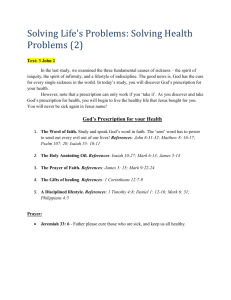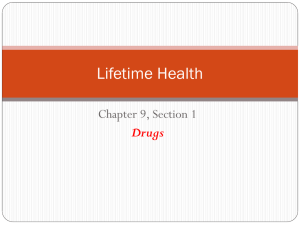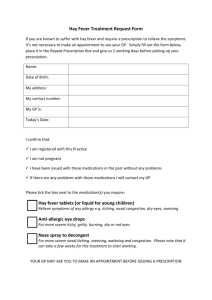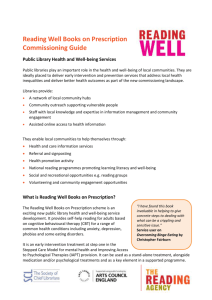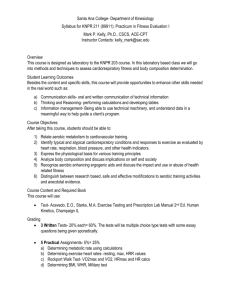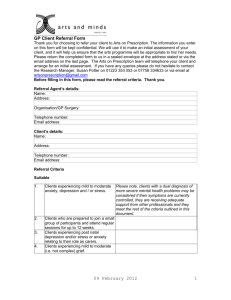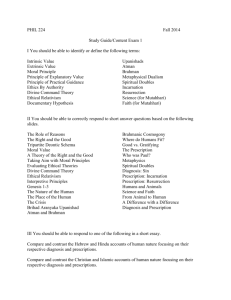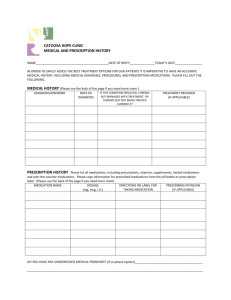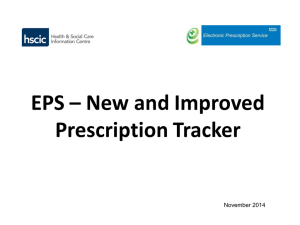Section eight: Management of Reading Well Books on Prescription
advertisement
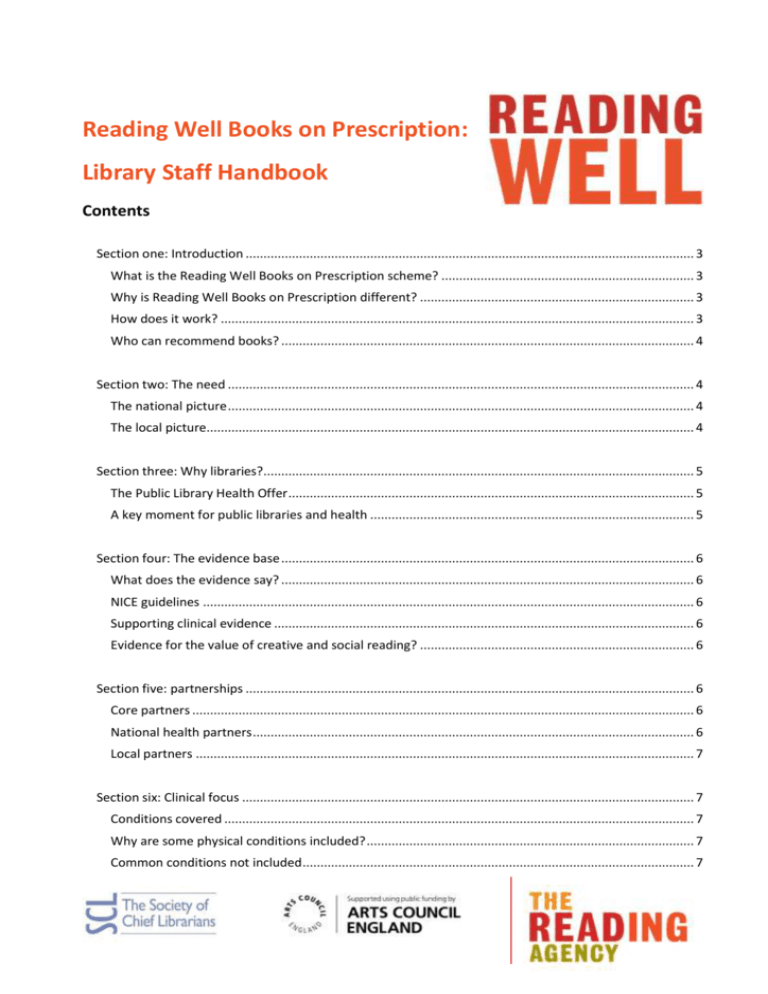
Reading Well Books on Prescription: Library Staff Handbook Contents Section one: Introduction .............................................................................................................................. 3 What is the Reading Well Books on Prescription scheme? ....................................................................... 3 Why is Reading Well Books on Prescription different? ............................................................................. 3 How does it work? ..................................................................................................................................... 3 Who can recommend books? .................................................................................................................... 4 Section two: The need ................................................................................................................................... 4 The national picture ................................................................................................................................... 4 The local picture......................................................................................................................................... 4 Section three: Why libraries?......................................................................................................................... 5 The Public Library Health Offer .................................................................................................................. 5 A key moment for public libraries and health ........................................................................................... 5 Section four: The evidence base .................................................................................................................... 6 What does the evidence say? .................................................................................................................... 6 NICE guidelines .......................................................................................................................................... 6 Supporting clinical evidence ...................................................................................................................... 6 Evidence for the value of creative and social reading? ............................................................................. 6 Section five: partnerships .............................................................................................................................. 6 Core partners ............................................................................................................................................. 6 National health partners ............................................................................................................................ 6 Local partners ............................................................................................................................................ 7 Section six: Clinical focus ............................................................................................................................... 7 Conditions covered .................................................................................................................................... 7 Why are some physical conditions included? ............................................................................................ 7 Common conditions not included .............................................................................................................. 7 Development plans .................................................................................................................................... 7 Section seven: Resources............................................................................................................................... 8 Core book list ............................................................................................................................................. 8 Print and digital materials .......................................................................................................................... 8 Reading Well Mood-boosting Books.......................................................................................................... 9 Reading Well Books on Prescription website ............................................................................................ 9 Reading Groups for Everyone .................................................................................................................... 9 Section eight: Management of Reading Well Books on Prescription .......................................................... 10 Central co-ordination of Reading Well Books on Prescription ................................................................ 10 A universal library health offer ................................................................................................................ 10 Guidelines for running Reading Well Books on Prescription ................................................................... 10 Community-managed libraries ................................................................................................................ 12 Organisations other than public libraries ................................................................................................ 12 Section nine: working with health partners and prescribers....................................................................... 12 The prescriber model ............................................................................................................................... 12 Working with health partners .................................................................................................................. 12 Section ten: Dealing with vulnerable people ............................................................................................... 13 Section eleven: Marketing Reading Well Books on Prescription ................................................................. 14 Marketing and branding guidelines ......................................................................................................... 14 Section twelve: Business and funding models ............................................................................................. 14 National resourcing.................................................................................................................................. 14 A shared model delivering profile and efficiencies.................................................................................. 14 Local commissioning ................................................................................................................................ 14 Section thirteen: Evaluation strategy .......................................................................................................... 15 2 Section one: Introduction What is the Reading Well Books on Prescription scheme? Reading Well Books on Prescription is an exciting new public library health service development, run by The Reading Agency in partnership with the Society of Chief Librarians and funded by the Arts Council England. Reading Well Books on Prescription provides self- help reading for adults based on cognitive behavioural therapy (CBT) for a range of common mental health conditions including anxiety, depression, phobias and some eating disorders. Books are available from local libraries on ‘prescription’ which means they have been recommended by GPs or other health professionals. Books are also available for anyone to read which means that some people may be borrowing a book without having been prescribed it as a first step in seeking help. Reading Well Books on Prescription is part of a suite of health projects run by The Reading Agency that also help people discover other well-being reading services in libraries including: Reading Well Mood-boosting Books, a national promotion of uplifting novels, poetry and nonfiction recommended by readers Social reading activity through Reading Groups for Everyone www.readinggroups.org. Although the creative reading elements of the scheme are not part of the formal referral process by health professionals, they are important and are highlighted both in the user guide and the guide for professionals. Why is Reading Well Books on Prescription different? Books on Prescription is not new; the model was first developed in Cardiff by Professor Neil Frude, a clinical psychologist. There has been a national scheme in Wales since 2005. Many library authorities in England have developed excellent local Books on Prescription schemes based on the Welsh model. Whilst many schemes are very successful, some library authorities have struggled with the challenge of building local health partnerships. There has also been no national overview, which has meant marked variations in practice. Stretched capacity and the current funding climate in local library authorities has also put local delivery of Books on Prescription under pressure and hindered innovation and development Reading Well Books on Prescription is the first national scheme for England; launched in 2013. It builds on existing local best practice to create a quality-assured and consistent model. It is supported by shared resources, economies of scale and national partners to provide value for money, cost efficiencies and support for local library/health advocacy and partnership development. It is also the first scheme to integrate self-help and creative and social reading into one delivery framework. How does it work? Reading Well Books on Prescription aims to increase access to quality-assured health information and advice able to help people understand and manage common mental health conditions. It is an early intervention treatment and part of ‘watchful waiting’ or ‘active monitoring’ at step one in the Stepped Care Model for mental health and Improving Access to Psychological Therapies (IAPT) provision. Health professionals can recommend books to people they might not yet refer to IAPT services, to use whilst waiting for or as part of treatment. 3 Reading Well Books on Prescription is not designed to replace existing care but to provide added value and guidance. It can be used as a stand-alone treatment, alongside medication and psychological approaches and as a key element in a supported therapeutic programme. The books are available in libraries for anyone to borrow. Some people may use library book collections independently without having seen a health professional. The user leaflet provides helpful advice regarding where to go for further help or what to do if the book doesn’t seem to be helping. Who can recommend books? GPs can recommend self- help reading from the Reading Well book list to their patients. Books can also be recommended by other health professionals including mental health nurses, counsellors, therapists, psychiatrists, psychologists and IAPT psychological well-being practitioners. Section two: The need The national picture There is an enormous need for quality-assured help with understanding and managing common mental health conditions. There are huge pressures on existing mental health services and stark inequalities in the treatment of mental illness compared to physical illness.1 One in four people suffer mental ill health in Great Britain in any one year. Depression and anxiety is most common and most frequently untreated with around 6 million people suffering from these conditions in England, three quarters of whom (4.5 million people) are not currently receiving any treatment.2 Community based self-help services such as Reading Well Books on Prescription are a cost-effective way of delivering early intervention care that can prevent the onset of more serious and acute symptoms. The local picture Local targets for the treatment of mild to moderate mental health conditions will be set by newly formed local authority Health and Well Being Boards, working with Public Health Departments and other key stakeholders. These targets will be informed by the findings of the local Joint Strategic Needs Assessment (JSNA). The JSNA analyses the health needs of populations to guide the strategic commissioning of health, wellbeing and social care services within local authority areas. The JSNA underpins local health and well-being strategies and strategic commissioning plans. It is important to consult your local JSNA in order to understand the health and well-being needs of your local community and how the Reading Well Books on Prescription scheme can help to meet them. 1 How Mental Illness Loses Out in the NHS, Centre for Economic Performance’s Mental Health Policy Group, LSE, 2012 How Mental Illness Loses Out in the NHS 2 4 Section three: Why libraries? The public library health offer The findings of recent health mapping research indicate that people see their library as a safe, trusted and non-stigmatised place to go for help with, and information about, health problems.3 This research also revealed that libraries provide a significant range of health and well-being services but that the offer is not always clear. The public library health offer is part of a suite of ‘national offers’ launched by the Society of Chief Librarians (SCL) in January 2013. It identifies the important role that libraries play in supporting the health and well-being of local communities. Public libraries are ideally placed to deliver community based early intervention and prevention services that address local health inequalities and deliver better health outcomes as part of the new commissioning landscape. They provide: A network of local community hubs Community outreach supporting vulnerable people Staff with local knowledge and expertise in information management and community engagement Assisted online access to health resources. They enable local communities to help themselves through: Health and care information services Referral and signposting Health promotion activity National reading programmes promoting learning literacy and well-being Social and recreational opportunities e.g. reading groups Volunteering and community engagement opportunities. A key moment for public libraries and health From April 2013 responsibility for public health has moved into local authorities, as a result of the Health and Social Care Act passed in 2012. New Public Health Directorates are charged with working with partners to improve local health outcomes, tackle the wider determinants of health and deliver new communitybased models of early intervention and preventative care. 3 Public Library Activity in the Areas of Health and Well-Being, Hicks, D., Creaser, C. et al, MLA, 2010 5 These changes provide an important opportunity for public libraries to position their health and well-being work as commissionable services. Many library services are successfully getting funding to support the delivery of targeted services such as Reading Well Books on Prescription because it helps to meets local mental health targets. Our commissioning guidelines will help you to make the right evidence-based arguments for your work to local commissioners. Section four: The evidence base What does the evidence say? Clinical evidence clearly supports the value of the books on prescription approach. NICE guidelines Guidelines from the National Institute for Health and Care Excellence (NICE) recommend CBT-based selfhelp approaches as a first step in the treatment of common mental health conditions including depression, anxiety, phobias, chronic fatigue and some eating disorders. Supporting clinical evidence Evidence is growing that self-help books based on the principles of CBT can be effective. For a review of the evidence base go to: readingagency.org.uk/readingwell The evidence suggests that guided self-help delivered as part of a programme of treatment is more effective than unguided self-help. Whilst there does need to be more research into unguided self-help including books, the research does support the idea that it is effective. Books alone can be useful. They are a cost efficient way of delivering information and techniques of proven effectiveness used by professionals and are a springboard into further professional help. Evidence for the value of creative and social reading? Whilst there is less clinical data for the well-being benefits of creative and social reading compared to selfhelp reading, evidence is nevertheless building to show that reading novels and poetry can reduce stress and that social reading activity, such as reading groups, can promote well-being, combat isolation and bring people together in supportive communities. Section five: partnerships Core partners Reading Well Books on Prescription is delivered by The Reading Agency working in partnership with the Society of Chief Librarians and local library services. The programme received development funding from the Arts Council England’s Library Development Initiative in 2012/13. National health partners The following health partners have helped with the development of the scheme have endorsed the list and are supporting its delivery: 6 Department of Health – Improving Access to Psychologies Therapies Programme (IAPT) Royal College of General Practitioners Royal College of Nursing Royal College of Psychiatrists British Association for Behavioural and Cognitive Psychotherapies (BABCP) British Association for Counselling and Psychotherapy (BACP) The British Psychological Society Mind Local partners Local partnerships supporting the scheme include local authority public health departments, local IAPT providers, health agencies, health libraries, hospitals, prisons, health agencies and other third sector health bodies. Section six: Clinical focus Conditions covered Reading Well Books on Prescription provides evidence-based self-help in the following areas: anger, anxiety, binge eating, chronic pain, depression, health anxiety, obsessions and compulsions, panic, phobias, relationship problems, self-esteem, sleep problems, social phobias, stress and worry. Why are some physical conditions included? The focus of the Reading Well Books on Prescription scheme is on providing professionally recommended resources to support the management of psychological distress and symptom management. This can be relevant to some physical conditions, such as chronic fatigue and pain. In relation to fatigue and chronic fatigue, Reading Well Books on Prescription suggests self-help in the form of books in which CBT has been proven to be effective in the treatment of fatigue. Research evidence indicates that general practitioners should be encouraged to use self-help literature to support the management of chronic fatigue. Common conditions not included Some common mental health conditions e.g. anorexia, bi-polar disorder and post-traumatic stress disorder have not been included in the 2013 Reading Well Books on Prescription scheme following the advice of health partners. The reasons for this are either that the evidence base is insufficient or that self-help treatment might be harmful without appropriate accompanying therapy. Development plans The Reading Well Books on Prescription development plan includes a 2014 review of the range of conditions included on the core list with a view to including new areas where the evidence base is 7 sufficient. Fundraising is also underway to support the development of linked lists in 2014 for children and young people, early onset dementia/Alzheimer’s and possibly some physical health conditions in 2015. Section seven: Resources Core book list The core book list of 30 expert endorsed self-help titles is a central resource for the scheme. It is supported by a spread sheet giving bibliographic details to support library purchasing. This spread sheet also identifies where these books are available in other formats e.g. audio, large print, braille, e-books, to help increase the accessibility of collections. There is also a book summary providing further information such as blurbs, formats and ISBNs for the selected core list books which will be available from www.readingagency.org.uk/readingwellresources The core book list of 30 books should be purchased by public libraries in sufficient quantities to provide access to the book collections through every library (see section x). They are the titles that will be recommended by health professionals. The Reading Well Books on Prescription core reading list is only available for use as part of the Reading Well Books on Prescription scheme and when supported by the Reading Well Books on Prescription printed resources. Permission to use the core list by organisations not subscribing to this scheme should be sought from The Reading Agency. The books were selected using an evidence-based approach supported by a rigorous process of consultation and expert advice. The titles have all been recommended by experts as useful, effective and accessible. The protocol for booklist selection provides further information about the selection process. The core book list has been endorsed by national partners. Additional material cannot be added to the list. There is, however, a space on the recommendation form for local resources such as manuals, fact sheets etc. to be highlighted. Local materials can also be signposted to via local library websites. The core book list is not a static resource. It will be reviewed on a regular basis by the Reading Well Books on Prescription expert group and users. Print and digital materials User leaflet The Reading Well Books on Prescription user leaflet is available in packs of 100 and should be used to support the core list book collections as it contains information about the Reading Well Books on Prescription scheme and signposting to further help and guidance. The user leaflet contains the core book list which can be used by health professionals to recommend books. It also includes a space for signposting to local resources. Library authorities are encouraged to accept this form, when signed by the user and prescriber, as sufficient evidence for library joining. 8 An online version of the user leaflet is also available. This is so that the leaflet can be viewed online but it is not for download. An online version of this prescriber recommendation form will also be available on www.readingagency.org.uk/readingwellresources. This will be made available to GPs through each surgery’s computer system. Guide for health professionals The Reading Well Books on Prescription guide for health professionals is also available in packs of 100. It should be distributed by each library authority to prescribers to support the delivery of the scheme. An online version of the guide for health professionals is also available. This is so that the leaflet can be viewed online but it is not for download. Posters A3 and A4 posters are available to help promote the scheme to the public, both in libraries and health settings. These can be purchased in packs of 10. How to get the most out of self-help reading Respected self-help author Lee Brosan has produced Making the Most out of your Book, a support guide to help people get the most out of self-help reading. Online professional toolkit To accompany this on-line library staff tool kit, there will be an on-line prescriber toolkit available soon. Reading Well Mood-boosting Books A new list of Mood-boosting Books is now available to support the Reading Well Books on Prescription scheme. There will be an additional list recommended by people who have been diagnosed with cancer later in the summer. Reading Well Books on Prescription website http://www.readingagency.org.uk/readingwell The Reading Well resources webpage – www.readingagency.org.uk/readingwell – includes helpful information and digital resources, including a commissioning guide to help library authorities approach commissioners about funding to support the delivery of Reading Well Books on Prescription. Reading Groups for Everyone Reading Groups for Everyone is run by The Reading Agency with support from the Society of Chief Librarians www.readinggroups.org. The site provides resources to help people find and join a reading group, including those targeted specifically at people with mental health conditions. The Reader Organisation supports a network of groups that read aloud. There is evidence to suggest that these groups offer therapeutic benefit and promote well-being. 9 Section eight: Management of Reading Well Books on Prescription Central co-ordination of Reading Well Books on Prescription The Reading Agency is managing the national delivery of the scheme and will act as the central point of contact for national co-ordination and administration, advocacy, national partnerships and development in partnership with the Society of Chief Librarians. This is similar to our role in the Summer Reading Challenge. The Public Library Health Offer Development Group consists of library representatives from each of the English regions and advises on the development and delivery of the scheme. Public library authorities are the local co-ordinating agencies for the scheme; managing local partnership development, advocacy, commissioning and fundraising. Public libraries will also manage book stock and the distribution of print resources and act as the contact point for enquiries from local GPs and other health professionals wishing to become involved as prescribers. A universal library health offer The scheme will be available in English libraries in the week beginning 10 June, following the national partnership launch on 4 June 2013. 83% of library authorities have signed up to the new scheme. According to SCL’s national offer definition, this means that the Reading Well Books on Prescription scheme is a universal library health service in England. In a period of cut backs and library closures, Reading Well Books on Prescription demonstrates how public libraries can deliver on a key policy area – improving the health and well-being of local communities. The scheme helps to raise libraries’ profile, levers in new resources and supports local authorities in delivering a consistent and quality assured level of service as cost effectively as possible. Guidelines for running Reading Well Books on Prescription The following delivery guidelines are suggested to help library authorities deliver the Reading Well Books on Prescription scheme: →Designate responsibility We suggest that library authorities identify a library staff member with responsibility for managing the local delivery of Reading Well Books on Prescription and inform The Reading Agency of this contact to ensure the receipt of regular information updates on readingwell@readingangency.org.uk. → Book collections We recommend that the full collection of 30 Reading Well Books on Prescription titles is stocked in sufficient quantities to ensure adequate provision for the local target audience. Some authorities have purchased collections for all library service points including mobiles and prison libraries. This level of provision may not be possible for all authorities but core list titles must be available through every library service point supported by the interlibrary loan system → Print materials Leaflets should be provided in sufficient quantities to ensure the effective delivery of the scheme. See ‘Ordering materials’ below for purchasing additional materials. There are guidelines available from The Reading Agency to help you estimate how many of the following you may need: 10 The Reading Well Books on Prescription user guide will ensure people are fully informed about how the scheme works and where to go for further support. These guides should be made available through libraries and partner agencies/prescribers The Reading Well Books on Prescription guide for professionals will ensure that health professionals know how to use the scheme and how to recommend books as part of treatment. These should be circulated to an identified network of health professionals able to recommend books. Posters are helpful to help raise awareness of the scheme with public and partners → Prescriber partnerships It is important to identify a network of appropriate health professionals able to recommend titles and to support people in understanding and managing their conditions. It may be a good idea to start with a small network of enthusiastic partners. Public health colleagues can help you build this network. → Concessions Most authorities are able to offer free reservations for Reading Well Books on Prescription titles as well as easy library joining for people with recommendation forms signed by a health professional. These are important baseline concessions that all authorities should aim to deliver where possible. Extended loan periods and no overdue charges are also key targets for the scheme → Reading Well Mood-boosting Books Reading Well Mood-boosting Books is an important strand of the Reading Well scheme and it is signposted in both the user guide and guide for health professionals. Where possible, Mood-boosting Book collections should be available in libraries and staff should be briefed on the links between Reading Well Moodboosting Books and Reading Well Books on Prescription. → Reading groups Similarly, it is important to update local reading group data on the national reading group database found at www.readinggroups.org and to inform staff that the Reading Well scheme also recommends local reading group activity. There is evidence to show that social reading activity can help promote well-being. Reading groups are a source of enjoyment and can make people feel included and part of a supportive social network. They can also help people explore life experiences through fictional characters and stories. You may offer specialised reading groups for people with mental health conditions within your authority, including read-aloud reading groups based on the Get Into Reading model. You may also offer mainstream reading group activity, which is equally relevant. → Ordering materials Materials can be ordered at designated times of the year to keep costs to a minimum. The main ordering opportunity will usually be in March. After that, there will be planned re-ordering slots available. Guidelines to support libraries with ordering materials are available from The Reading Agency. Library authorities should also discuss local needs with the local authority Public Health Department. For further information about ordering materials contact readingwell@readingagency.org.uk. → Distribution of materials 11 Materials will be delivered to agreed central library contact points. Library authorities will be responsible for local distribution to health partners. Public health colleagues may be able to help or even manage this distribution for libraries. Whilst some material will be available in libraries, the intention is that the much of it will be distributed by libraries to local health partners including GPs, community mental health nurses and local IAPT providers. You can download a template letter to help you approach relevant health professionals with information about the scheme. → Working with public health colleagues Relevant library staff will find it helpful to contact public health colleagues to discuss partnership opportunities linked to the local delivery of Reading Well Books on Prescription. Public health colleagues can help identify relevant prescribers, distribute materials to health professionals and advise on funding and commissioning opportunities. The best place to start is by contacting the Director of Public Health. Community-managed libraries Community-managed libraries can deliver the scheme if they are able to do so within the guidelines outlined. They should contact their local authority library service to confirm any arrangements for joint working. Organisations other than public libraries Organisations other than public libraries can take part in the scheme as long as they meet the delivery guidelines outlined above. Such organisations include health organisations/agencies, prisons, third sector agencies, HE and FE colleges. Independent organisations must ensure they contact the local library service to explore partnership opportunities. Section nine: working with health partners and prescribers The prescriber model Health professionals may recommend books to patients as part of the Reading Well Books on Prescription scheme. These books are then collected from the library on submission of the recommendation form. It is important that books on the core list are available on the open shelves for everyone to use. Some people may use the book collections independently as a first step in seeking quality-assured health information and help with managing their well-being. Picking up a Reading Well Books on Prescription leaflet and borrowing a book may be a springboard to seeking more formal support. Other people may have received a book recommendation from a health professional but may not wish to be formally identified. They may therefore wish to borrow the book without handing in their recommendation form. Where recommendation forms are handed in, these should be kept for evaluation purposes. Working with health partners Public library authorities are the local co-ordinating agencies for the scheme and manage local partnership development. Public libraries will manage book stock and resources and act as the contact point for enquiries from local GPs and other health professionals wishing to become involved. It is a local decision as 12 to whether libraries charge health professionals for materials. The best model is to provide these for free to health professionals with local commissioning support. We are aiming to promote Reading Well Books on Prescription scheme through national advocacy and the communication of key messages supporting the launch event on 4 June. This communications work via partnership networks is being led by The Reading Agency and the Society of Chief Librarians. Health professionals informed by this means will be directed to contact their local library service if they wish to sign up to the scheme. The Reading Agency will direct any sign-up enquiries it receives to the relevant library service via the agreed contact point. Library authorities should also contact their public health department to help identify local prescribing partners. Section ten: Dealing with vulnerable people Public library staff are usually expert at dealing with the general public. Nevertheless it is important to make sure that all frontline staff are aware that people using the Reading Well Books on Prescription scheme may require extra sensitivity, discretion and support. People using the scheme may find it difficult to approach staff for help, and they may also be lacking in concentration and confidence. It is important that they are supported as much as possible, that systems are clear and that confidentiality is guaranteed. If the book they require is not available immediately, a copy should be reserved and the customer informed of the expected date of availability. It is recommended that reservations for core list titles are free of charge if possible. If the customer is not a member of the library, library joining should be made as simple as possible. We are recommending that a recommendation form signed by a health professional and including the name and address of the customer is sufficient to join. Library procedures should be explained and the loan period and renewal systems made clear. Some people may not wish to draw attention to the fact that they are borrowing a self-help book and may want to borrow the book without handing in the recommendation form. Staff should be made aware that they should not give an alternative book to someone who has had a title specifically recommended by a health professional but should reserve the title People borrowing self-help books may also be interested in other health and well-being services available in the library, such as Reading Well Mood-boosting Books and reading groups. It will be helpful to draw attention to these services if it possible to do so. Approach your local IAPT provider about staff training in dealing with people with mental health conditions. Many local IAPT organisations are happy to provide this for library staff. 13 Section eleven: Marketing Reading Well Books on Prescription Marketing and branding guidelines Branding and communication guidelines are available to support the marketing of and communications about the Reading Well Books on Prescription scheme. These guidelines have been designed for use by libraries, publishers and partners. They include key messages, visual guidelines and information about the use of the Reading Well and partner logos. Section twelve: Business and funding models National resourcing National fundraising is underway to underpin a three-year development plan for the Reading Well Books on Prescription scheme. Income from the sale of resources is being invested to cover central Reading Agency staffing and development costs. A shared model delivering profile and efficiencies A shared national model is a cost-effective way of working. Reading Well Books on Prescription saves costs for libraries and for commissioners. It delivers a low cost, early-intervention community service, delivering health and well-being benefits to local communities. It also raises the profile of the public library contribution to the health agenda and has brokered some important new national and local library partnerships. Reading Well Books on Prescription: Delivers economies of scale resulting in high quality resources at lower cost Centralises administration and management releasing capacity at the frontline and reducing local overheads Avoids duplication and reinventing of the wheel Helps build the national evidence base Local commissioning It also delivers a commission-ready product eligible for local commissioning funding. The government has recently ring fenced £5.45 billion for the delivery of local authority health services. Library services should identify where the scheme can deliver against local mental health targets and local health and well-being strategies to help build local commissioning proposals. Commissioners can be asked to support the delivery of the scheme in the following ways: The purchase of library self-help book collections The purchase of Reading Well Books on Prescription user guides, guides for health professionals and promotional posters Support with the distribution of materials to prescribers and with the building of prescriber partnerships 14 Local advocacy for the scheme The purchase of linked Reading Well Mood-boosting Books, a national promotion of uplifting novels, poetry and non- fiction recommended by readers Support for linked social and recreational reading group activity in libraries Section thirteen: Evaluation strategy A separate evaluation strategy is available to support monitoring and data collection linked to the scheme. For more information about the scheme, contact: Debbie Hicks debbie.hicks@readingagency.org.uk readingwell@readingagency.org.uk 15
